
The United States-led invasion of the Republic of Iraq was the first stage of the Iraq War. The invasion began on 19 March 2003 and lasted just over one month, including 26 days of major combat operations, in which a combined force of troops from the United States, the United Kingdom, Australia and Poland invaded Iraq. Twenty-two days after the first day of the invasion, the capital city of Baghdad was captured by coalition forces on 9 April after the six-day-long Battle of Baghdad. This early stage of the war formally ended on 1 May when U.S. President George W. Bush declared the "end of major combat operations" in his Mission Accomplished speech, after which the Coalition Provisional Authority (CPA) was established as the first of several successive transitional governments leading up to the first Iraqi parliamentary election in January 2005. U.S. military forces later remained in Iraq until the withdrawal in 2011.
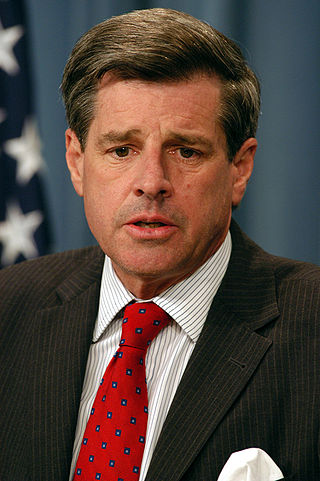
Lewis Paul Bremer III is a retired American diplomat. He was the second de facto head of state of Iraq as leader of the Coalition Provisional Authority (CPA) following the 2003 invasion of Iraq by the United States, from May 2003 until June 2004.
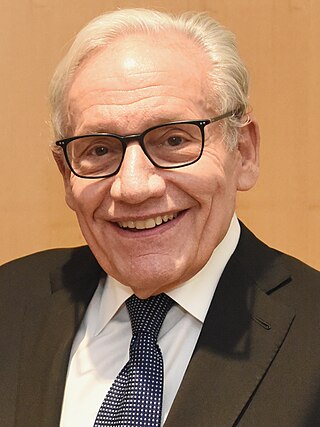
Robert Upshur Woodward is an American investigative journalist. He started working for The Washington Post as a reporter in 1971 and now holds the title of associate editor.

Mark David Danner is an American writer, journalist, and educator. He is a former staff writer for The New Yorker and frequent contributor to The New York Review of Books. Danner specializes in U.S. foreign affairs, war and politics, and has written books and articles on Haiti, Central America, the former Yugoslavia, and the Middle East, as well as on American politics, covering every presidential election since 2000. In 1999, he was named a MacArthur Fellow.
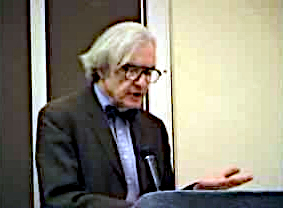
Robert Jay Lifton is an American psychiatrist and author, chiefly known for his studies of the psychological causes and effects of wars and political violence, and for his theory of thought reform. He was an early proponent of the techniques of psychohistory.

Hegemony or Survival: America's Quest for Global Dominance is a book about the United States and its foreign policy written by American political activist and linguist Noam Chomsky. It was first published in the United States in November 2003 by Metropolitan Books and then in the United Kingdom by Penguin Books. It was republished by Haymarket Books in January 2024.
William Rivers Pitt was an American author, editor, and liberal political activist.
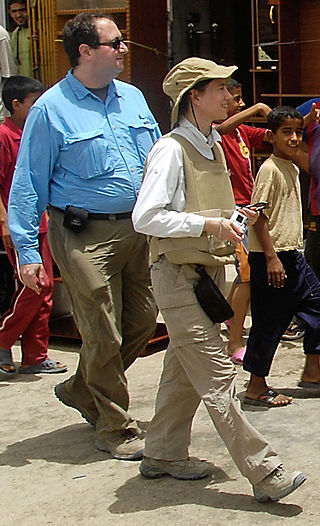
Frederick W. Kagan is an American resident scholar at the American Enterprise Institute (AEI) and a former professor of military history at the U.S. Military Academy at West Point.

In Christianity, a martyr is a person who was killed for their testimony for Jesus or faith in Jesus. In years of the early church, stories depict this often occurring through death by sawing, stoning, crucifixion, burning at the stake, or other forms of torture and capital punishment. The word martyr comes from the Koine word μάρτυς, mártys, which means "witness" or "testimony".
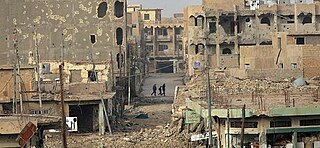
The Iraqi civil war was an armed conflict from 2006 to 2008 between various sectarian Shia and Sunni armed groups, such as the Islamic State of Iraq and the Mahdi Army, in addition to the Iraqi government alongside American-led coalition forces. In February 2006, the insurgency against the coalition and government escalated into a sectarian civil war after the bombing of Al-Askari Shrine, considered a holy site in Twelver Shi'ism. US President George W. Bush and Iraqi officials accused Al-Qaeda in Iraq (AQI) of orchestrating the bombing. AQI publicly denied any links. The incident set off a wave of attacks on Sunni civilians by Shia militants, followed by attacks on Shia civilians by Sunni militants.
Michael Massing is an American writer based in New York City. He is a former executive editor of the Columbia Journalism Review. He received a bachelor's degree from Harvard College and a master's degree from the London School of Economics. He often writes for the New York Review of Books on the media, politics, and foreign affairs. He has also written for The American Prospect, The New York Times, The Nation, The New Yorker, The Guardian, Politico, and The Atlantic. His book The Fix offers a critique of the U.S. war on drugs. Now They Tell Us: The American Press and Iraq is a collection of articles which first appeared in The New York Review of Books and analyzes the press coverage of the Iraq war. A later book, Fatal Discord: Erasmus, Luther, and the Fight for the Western Mind, concerns the rivalry between those two men and the movements they represented—Christian humanism and evangelical Christianity; The New York Times named it a Notable Book of 2018. Massing is co-founder of the Committee to Protect Journalists (CPJ) and currently sits on its board. He is also a board member of the Alicia Patterson Foundation. In 1992, he was named a MacArthur Fellow, and in 2011 he was a fellow at the Leon Levy Biography Center at the City University of New York Graduate Center.

Murray S. Waas is an American independent journalist and investigative journalist best known for his coverage of the White House planning for the 2003 invasion of Iraq and ensuing controversies and American political scandals such as the Plame affair. For much of his career, Waas focused on national security reporting, but has also written about social issues and corporate malfeasance. His articles about the second Iraq war and Plame affair matters have appeared in National Journal, where he has worked as a staff correspondent and contributing editor, The Atlantic, and, earlier The American Prospect.
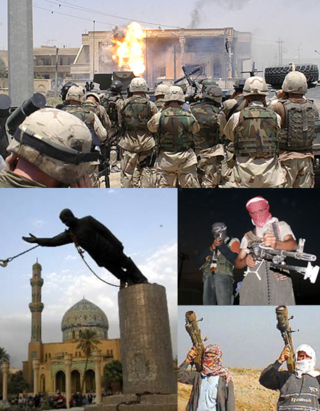
The Iraq War, sometimes called the Second Persian Gulf War was a protracted armed conflict in Iraq from 2003 to 2011. It began with the invasion of Iraq by the United States-led coalition that overthrew the Ba'athist government of Saddam Hussein. The conflict continued for much of the next decade as an insurgency emerged to oppose the coalition forces and the post-invasion Iraqi government. US troops were officially withdrawn in 2011.
In the Hearts of Green Birds: The Martyrs of Bosnia, a book by various anonymous authors about the war in Bosnia and Herzegovina, is a foundational text in Islamist literature and exists in numerous languages and recensions. It focuses on the deaths of foreign Muslims who had gone to Bosnia to serve as fighters, or mujahadin and describes their deaths as that of martyrs. The book is available on many Internet sites and is especially popular in audio format, which was the original form before it appeared as a printed text. Audio versions include anaasheed, Islamic-oriented songs that were recorded by shuhadaa before their deaths.

Nir Rosen is an American journalist and chronicler of the Iraq War, who resides in Lebanon. Rosen writes on current and international affairs. In 2014 he was a special adviser for the Centre for Humanitarian Dialogue, a conflict resolution NGO.

"A Problem from Hell": America and the Age of Genocide (2002) is a book by American Samantha Power, at that time Professor of Human Rights Practice at Harvard's John F. Kennedy School of Government, which explores the United States's understanding of, response to, and inaction on genocides in the 20th century, from the Armenian genocide to the "ethnic cleansings" of the Kosovo War. It won the J. Anthony Lukas Book Prize and the Pulitzer Prize for General Non-Fiction in 2003.

Eliot Weinberger is an American writer, essayist, editor, and translator. He is primarily known for his essays and political articles, the former characterized by their wide-ranging subjects and experimental style, verging on a kind of documentary prose poetry, and the latter highly critical of American politics and foreign policy. His work regularly appears in translation and has been published in more than thirty languages.
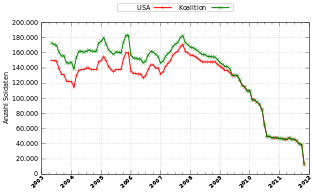
The Iraq War troop surge of 2007, commonly known as the troop surge, or simply the surge, refers to the George W. Bush administration's 2007 increase in the number of U.S. military combat troops in Iraq in order to provide security to Baghdad and Al Anbar Governorate.

Edward Wadie Said was a Palestinian-American philosopher, academic, literary critic, and political activist. As a professor of literature at Columbia University, he was among the founders of post-colonial studies. As a cultural critic, Said is best known for his book Orientalism (1978), a foundational text which critiques the cultural representations that are the bases of Orientalism—how the Western world perceives the Orient. His model of textual analysis transformed the academic discourse of researchers in literary theory, literary criticism, and Middle Eastern studies.

Elliot Ackerman is an American author and former Marine Corps special operations team leader. He is the New York Times–bestselling author of the novels 2034: A Novel of the Next World War, Red Dress In Black and White, Waiting for Eden, Dark at the Crossing, and Green on Blue, and the upcoming Halcyon: A Novel, as well as the memoirs The Fifth Act: America’s End in Afghanistan and Placesand Names: On War, Revolution, and Returning. His books have received significant critical acclaim, including nominations for the National Book Award, the Andrew Carnegie Medals in both fiction and non-fiction, and the Dayton Literary Peace Prize. He served as a White House fellow in the Obama administration and is a Marine veteran who served in Iraq and Afghanistan. He is a contributing writer to The Atlantic and The New York Times. He was awarded the Silver Star, the Bronze Star with Valor, and a Purple Heart during his five deployments to Afghanistan and Iraq.

















